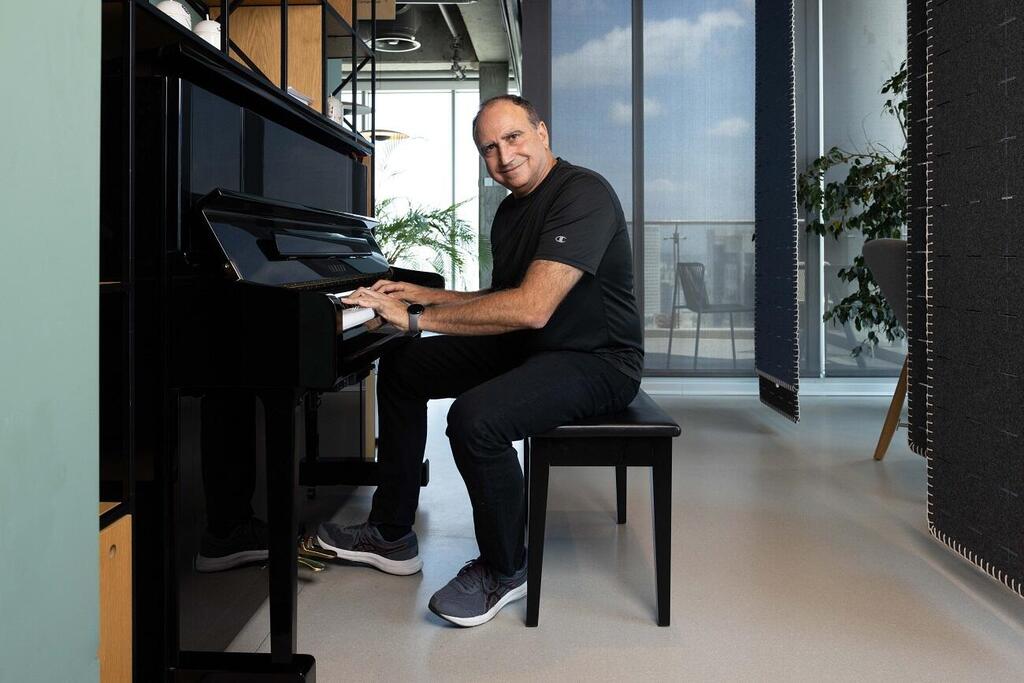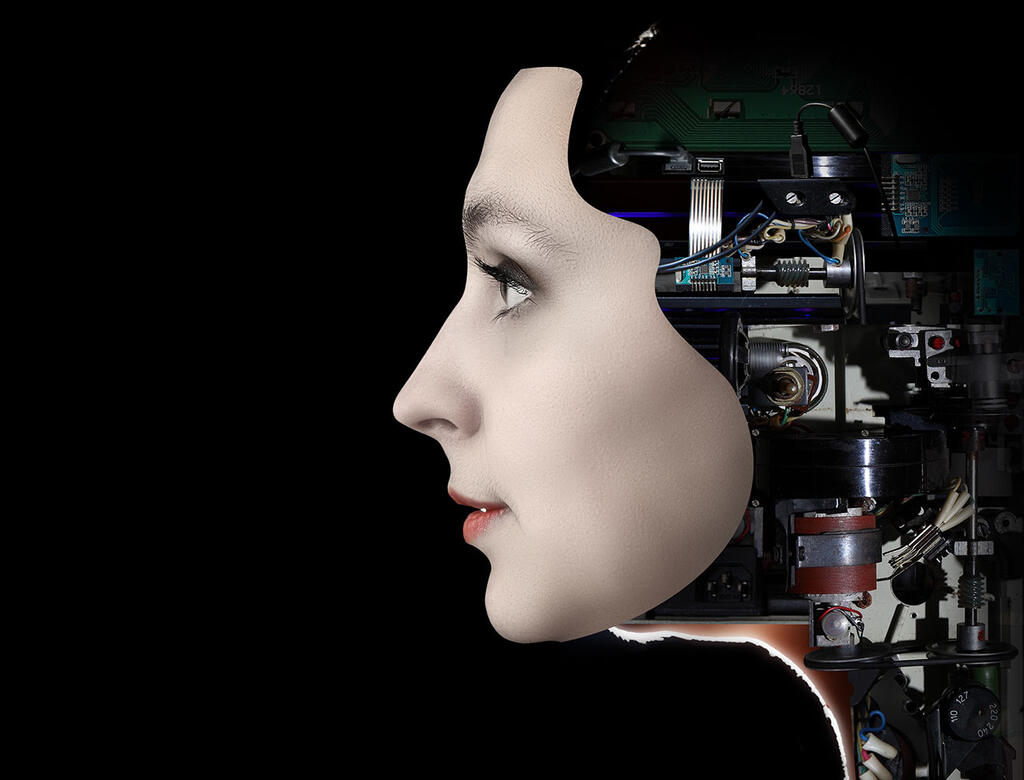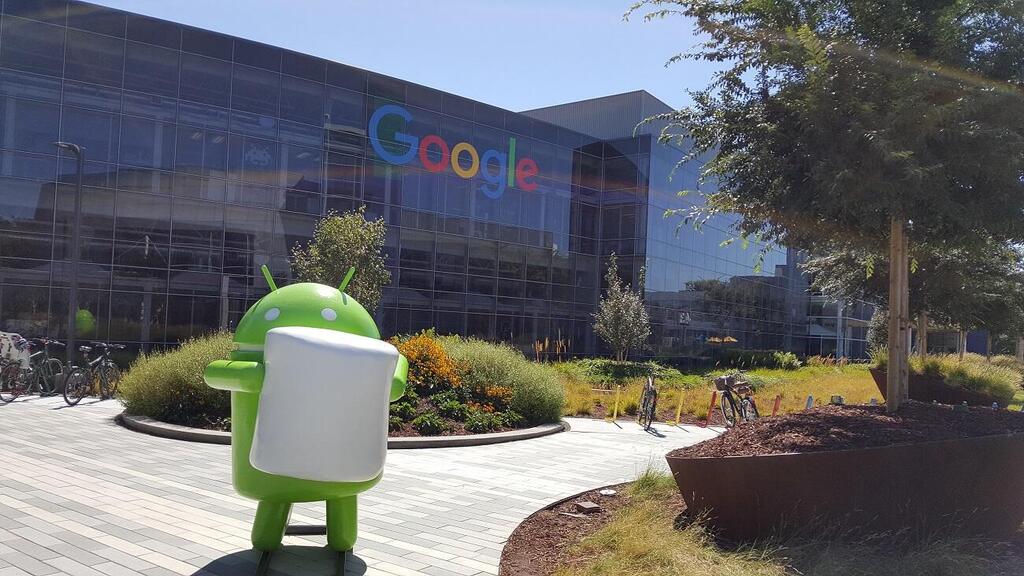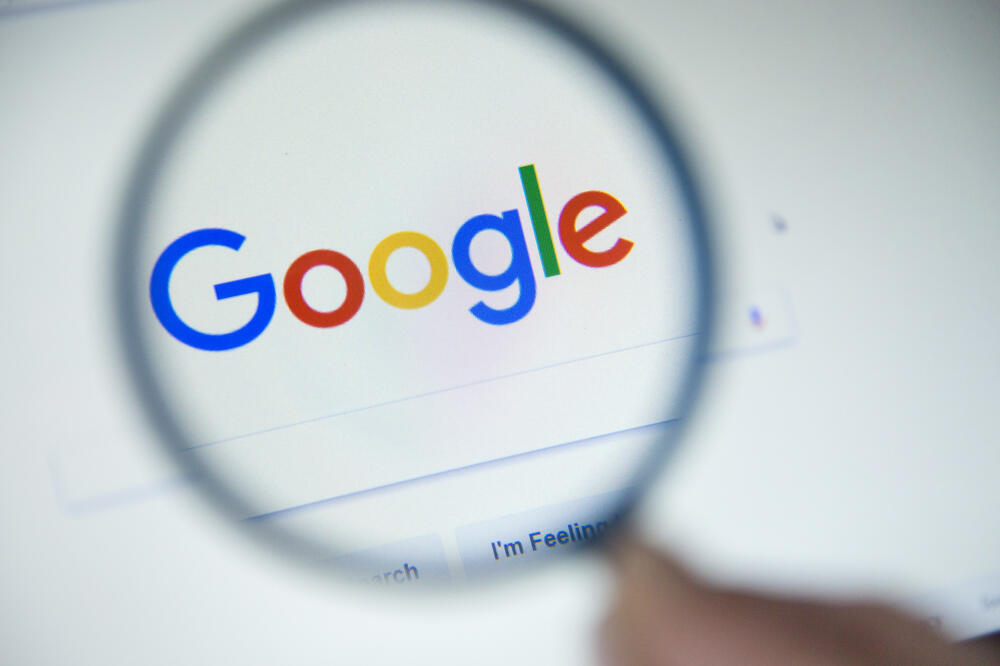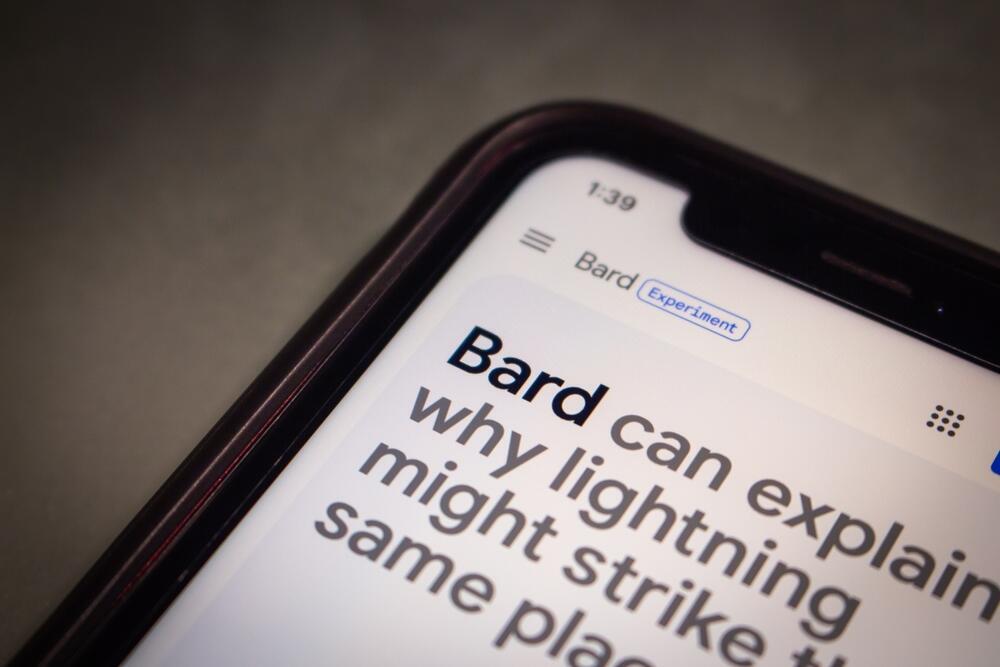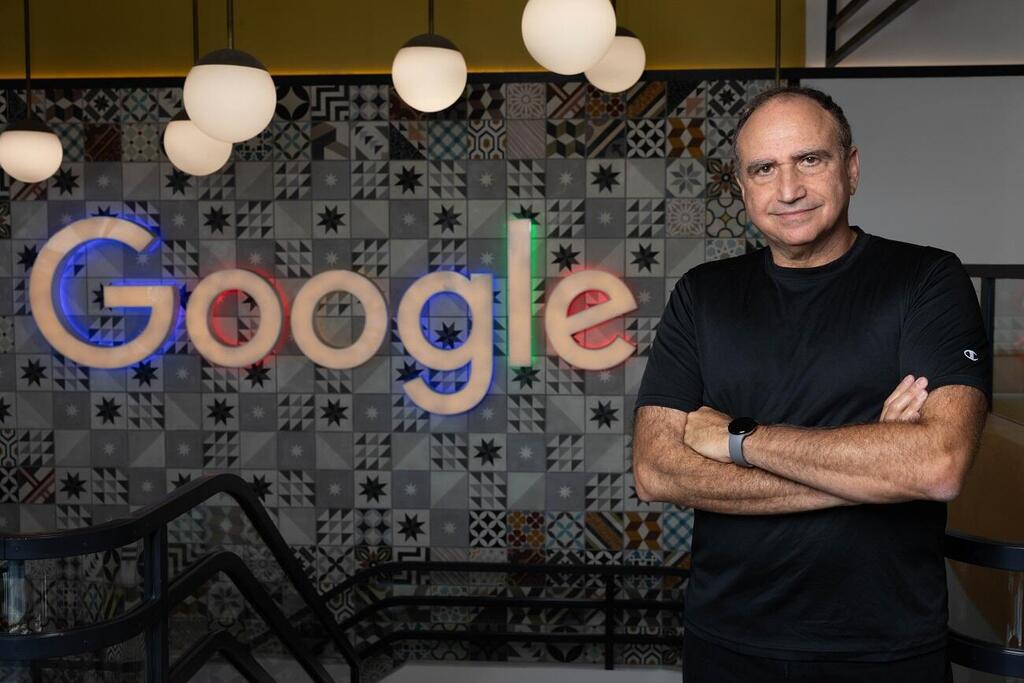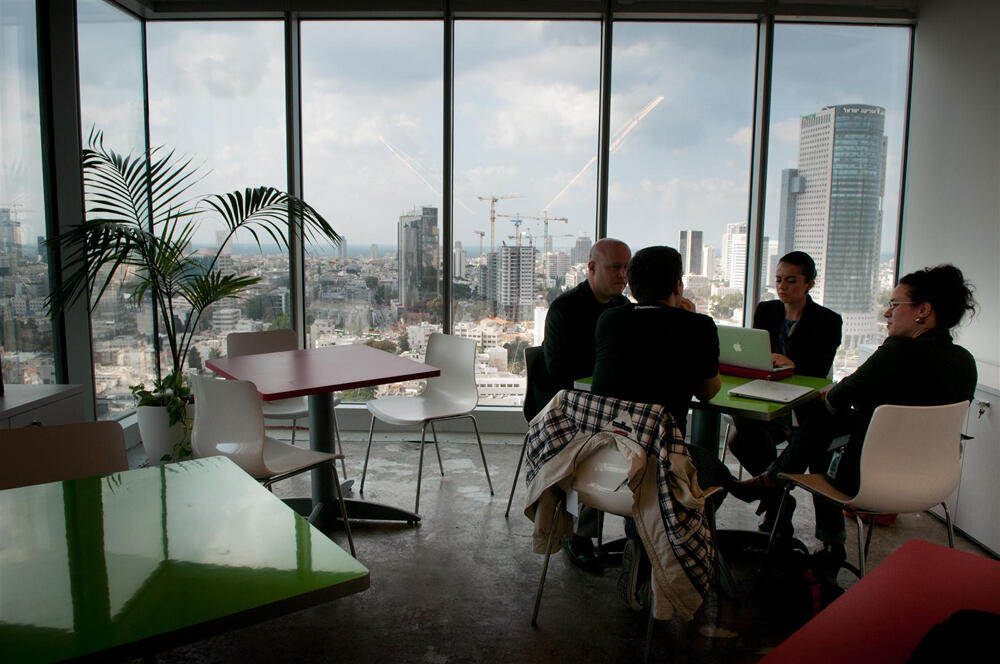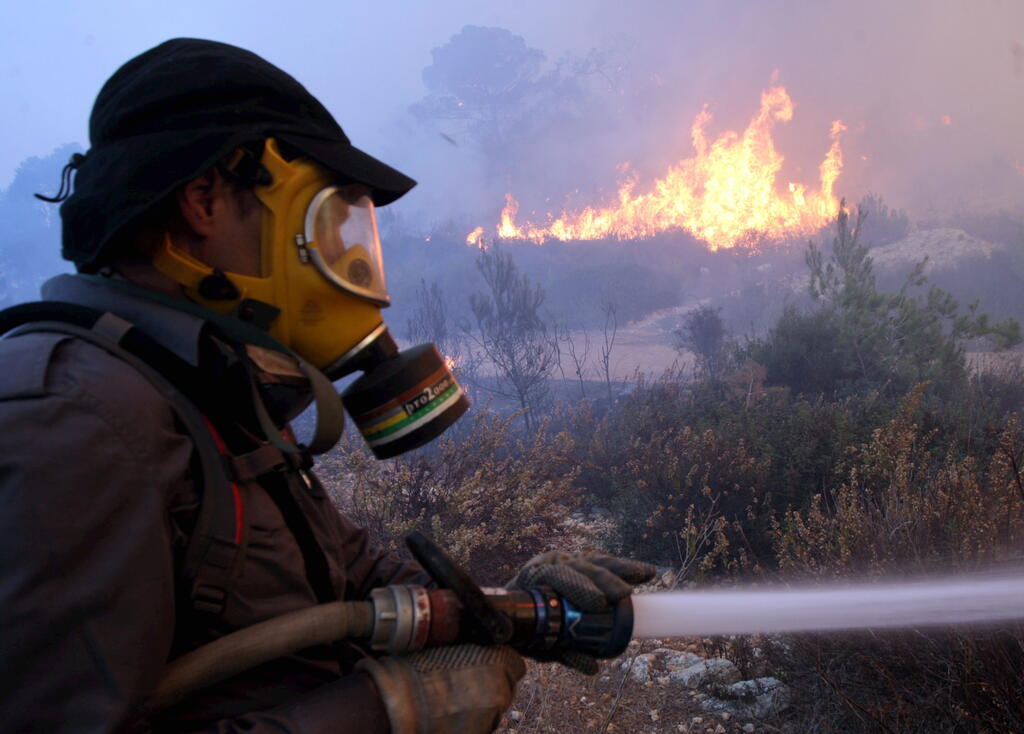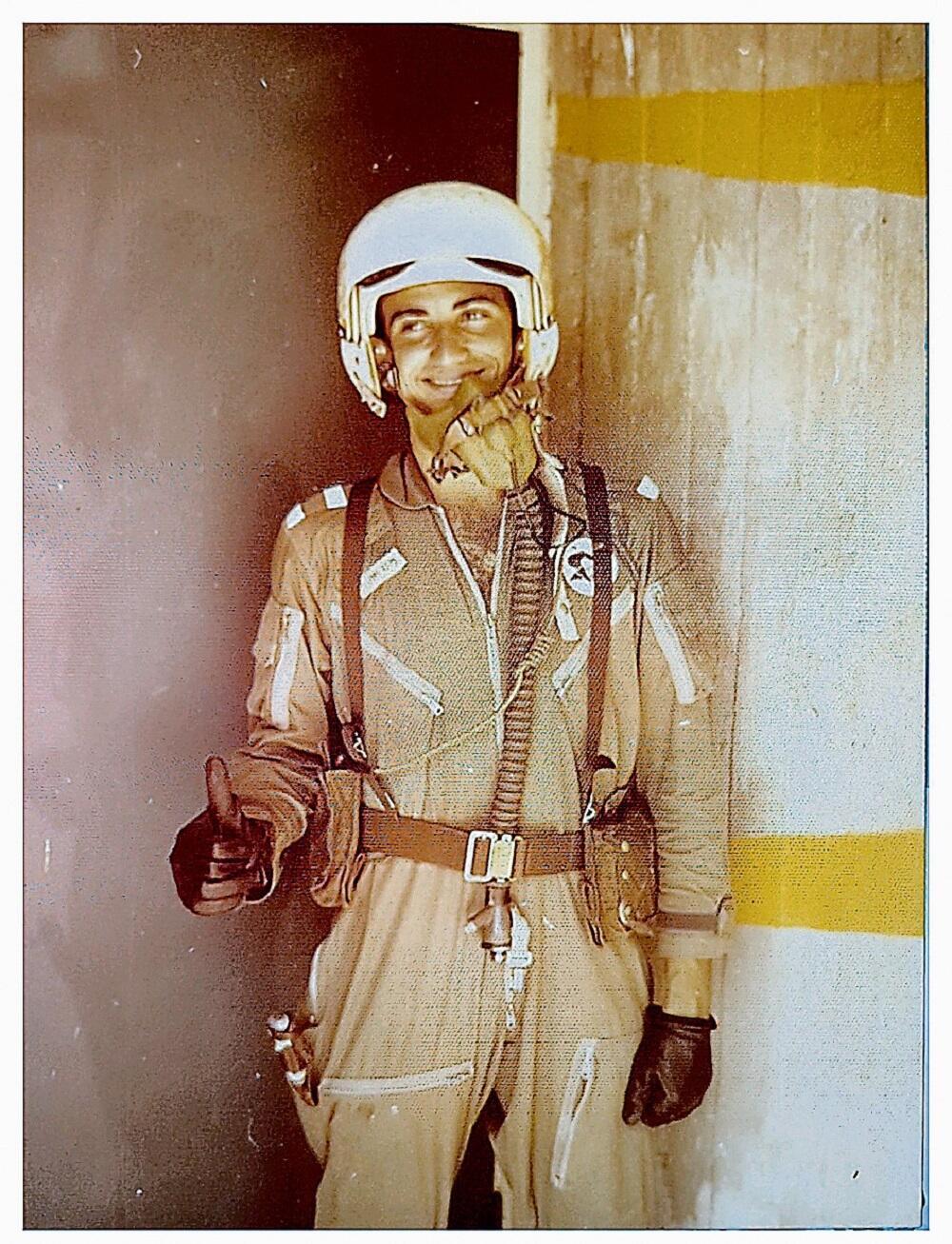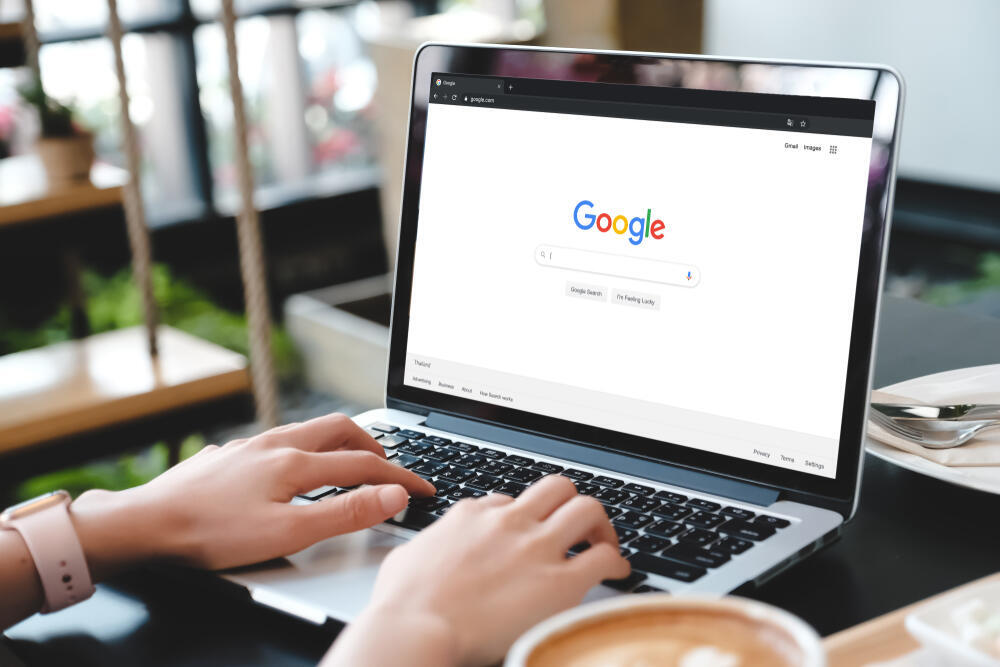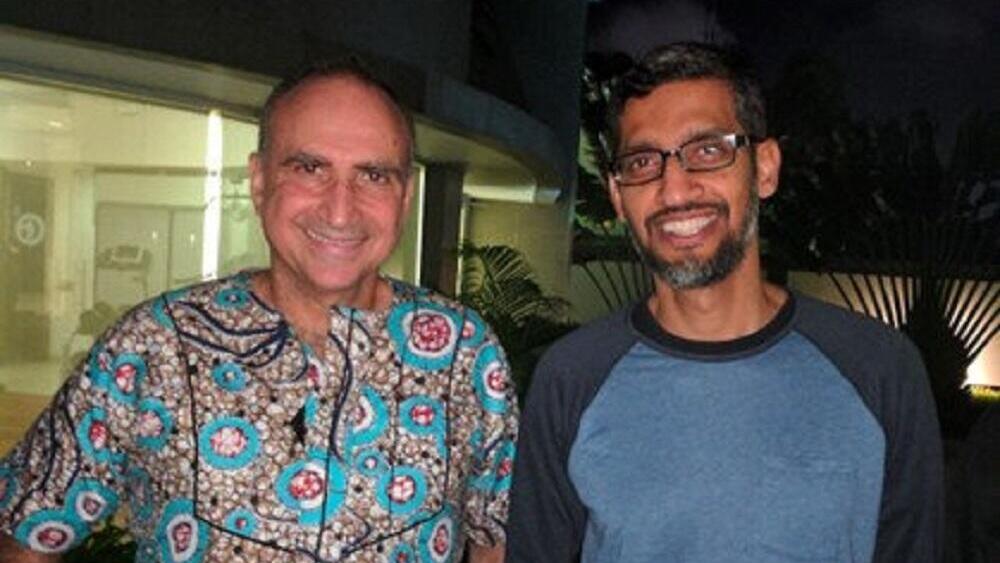Like the late Steve Jobs, Prof. Yossi Matias's wardrobe consists only of black T-shirts. While Jobs had 100 specially designed by Japanese designer Issey Miyake, Matias settles for off-the-shelf Under Armour models and keeps a single jacket for special occasions.
More stories:
Matias, Google's global vice president for engineering and research and the managing director of Google's Research and Development Center in Israel, is an unusual figure among tech executives in the country.
He is 65 years old, one of the veterans, born in Haifa, and a former pilot in the Air Force. In his youth, he was a competitive athlete and even represented Israel in the Maccabiah Games in triple jump. He is also an amateur pianist who occasionally accompanies singers at company events.
Matias oversees 2,000 developers, engineers and researchers out of Google's total 2,300 employees in Israel. He also concurrently manages Google's development centers in India and Africa. Despite being responsible for developments that impact billions worldwide, he is considered one of the most reclusive figures in the industry and rarely speaks to the media.
However, on the occasion of the global company's 25th anniversary, he feels the need to comment. "Google's founding brought about a revolution 25 years ago," he says in an interview. "Now the next wave of the revolution, artificial intelligence, is here, and in Israel, we're again at the forefront."
For a decade, Prof. Matias led Google's search domain, the function most identified with the company. The R&D center in Israel, under his leadership, has been responsible for some of the most significant innovations in this area: Google Trends, for example, which was among the first to be developed in Israel, designed to highlight global trends at their early stages – from disease outbreaks and economic crises to the popularity of car models, ice cream flavors or reality show contestants.
AutoComplete – the automatic completion of words while typing in the search bar – was born in Israel long before artificial intelligence became a buzzword. Matias's team is also behind the instant display of weather or sports event results on the search page, from organizing the information to its graphic design.
Significant danger
Matias is now considered one of the leaders in the field of artificial intelligence at Google. Nevertheless, he was one of the signatories to the alarming letter that made headlines around the world, in which over 1,120 scientists, researchers, and executives from leading technology companies warned of the "risk of losing control over our civilization" due to the rapid developments in artificial intelligence.
Coincidentally, we meet in a week when Google announces the addition of a feature called AI Duet to its office software environment, which allows employees to send artificial intelligence in their place to meetings, summarize them autonomously, take notes and even delegate tasks.
You see, this is precisely what we fear – that AI will easily replace flesh and blood workers. We might face a wave of unemployment like we've never known before.
"Artificial intelligence will affect, and is already affecting, many of the ways we work. It's very hard to predict such changes — some happen slowly, some quickly — and they will surprise us in both directions. We must take very seriously the areas in which AI could cause what's termed a 'disruption'. But I am among many who believe it will create more opportunities for us than problems."
So how does that square with your signing the experts' letter warning about its dangers, essentially calling out to the world ‘hold us back’?
"Artificial intelligence has enormous positive impacts on the world in almost every field. It saves lives. However, precisely because it's so significant, it's too important to be left without oversight, or for that oversight not to be implemented properly.
“Assuming that even those with malicious intent have access to this technology, the question is how to prevent situations where it might be used dangerously in the future, or where unforeseen results might occur. That's why I signed that letter. Not because I'm nervous or afraid, but because I believe we need to act responsibly as a society.
“The danger is so significant that we need to sound the alarm now. Clearly, it should be a global debate, and ideally, it should involve stakeholders, including experts from industry, academia and the public. I don't believe we're facing existential dangers right around the corner, but with the rate at which technology is advancing, we need to think about these things today."
"At Google, our approach to artificial intelligence dictates that development should be done responsibly right from the planning stage. Google was one of the first companies to publish what we call 'AI Principles' in 2007, which stipulate that in AI development, we consider aspects such as ethics and fairness — to prevent biases like racism, and also issues like privacy and accessibility for all."
When did you realize that the focus in the technology world was shifting toward AI?
"I've always been fascinated by the subject. My final project in my undergraduate degree was a program that learned to play a game; I wrote a program that beat me and everyone who tried it using technology based on ideas from the 1950s. Later, as a researcher at Bell Labs, I explored how to extract insights from vast information, from big data, that would assist in performing tasks more efficiently.
“About seven years ago, it became clear to me that machine learning was going to change everything: we saw that AI technology could understand an image. I realized that this was a dramatic change not only in technology but also in science; entire scientific fields were gradually being replaced by machine learning methods.
“Until then, search had been the main challenge in our work in Israel, and I devoted most of my time to it. But at that point, I understood that research needed to be approached from a different angle. For instance, the Google Duplex project is considered a revolutionary milestone in AI's ability to conduct a phone conversation with a user."
Matias is referring to the feature designed for phones, which, when launched in 2018, managed to astonish millions: it allows you to ask the personal assistant on the phone to reserve a table at a restaurant or make an appointment at the hairdresser's. The assistant itself dials the business and conducts the conversation, including the requisite "umm…" and "uh...". Two years ago, they also introduced Hold For Me, another made-in-Israel product, which waits for you on hold for a representative; when the line is available, the device vibrates and sounds an alert.
Is there anything left to innovate in the search domain, or is all the effort now transitioning to AI?
"That's the beauty of this field: every new technology can surprise, enchant and astonish us, and then, quite quickly, we get used to it, and it becomes an integral part of our lives. My son once criticized me, saying, 'You guys did a terrible job — I translated a specific page with Google and there's a sentence here that makes no sense at all'. I thought to myself: Wow, just a few years ago, the very possibility of translating a web page seemed like science fiction. He grew up with this capability. To me, that is the greatest success of technology."
"I remember when we were excited about voice search here; today, you're not thrilled by that. Now you can also take your phone, and using Google Lens, point it at an object and search for it online. More than 12 billion such searches are conducted a month. When I'm abroad, I can focus my smartphone on a sign in Greek, Spanish or any other language, and it reads the English translation out to me. By the way, the reading technology was developed in Israel. Similarly, I can focus on a plant and check if it's poisonous, or on a skin lesion and get an assessment of its nature. This is also technology developed by the team in Israel."
Just this week, the landmark trial against Google began, where the U.S. government alleges that Google leveraged its monopolistic power to dominate global search. That's your baby.
"Our search engine makes global information accessible to billions around the world, and they choose it simply because it helps them. Our engineers are constantly improving it. We intend to demonstrate to the court how we create a competitive product that provides the most useful search experience."
Proud of Hebrew
The recent breakthrough in AI has ironically come from language model-based chatbots. Facing ChatGPT which amazed us all, Google introduced Bard, and its competitors also launched their own apps. However, the error rate in all of them is especially high; questions directed to Bard often receive completely absurd answers.
Matias doesn't evade the issue. "It's absolutely true that Bard has limitations, just like other language models. It occasionally errs, and we continue to improve its accuracy. When it comes to facts, we explicitly recommend verifying them and not relying on it as the sole source. That's also why we label it as an experiment. But it's essential to note that even now, the opportunities it unlocks are immense: from new creative ideas, summarizing long texts, spellchecking, assisting in email writing and much more. It's a fantastic tool, and it will only improve.
"If you had asked me two years ago if the world was ready to use imperfect artificial intelligence, I wouldn't have foreseen it. But once you understand the world's thirst for this capability, you adapt. In the last three years, our Israeli team conducted numerous studies on this topic. There's no magic solution. There's a massive amount of research and technological work here, which will continue for a long time."
For instance, could the interfaces merge – so that tomorrow's standard search will integrate within the Bard interface or vice versa, and also include the voice interface?
"Breaking down barriers between text, image and video is very important to me for several reasons: Firstly, it enables accessibility for people with disabilities. One of the technologies developed in Israel, which I am very proud of, allows the deaf to 'speak' on the phone. It is based on an artificial intelligence app that converts voice to closed captions displayed on the screen, and vice versa. It was an initiative by one of our engineers who came up with the idea, and within a year, the product was already showcased.
“I remember the moment when I saw a quote from a deaf person who wrote to his father: 'Dad, this is the first time we're talking on the phone'. Or the text-to-speech capability that we developed here, also in Hebrew. I use it while driving or running, but there are people who can't read, and this is their only way to access the Internet."
Speaking of Bard, its results in Hebrew are not as good as in the English version. And why isn't there Hebrew in other Google products yet — in Google Assistant, for example, or in the smartwatch?
"Artificial intelligence, as is known, is based on training models with vast amounts of data, and the fact is - there is more data in other languages. We also have to acknowledge that the number of Hebrew speakers worldwide is not large.
“As Israelis, we advanced many things quietly. For instance, we ensured that the development of the right-to-left interface, which is a complex issue, would be carried out faster. And I'm very proud of the fact that Bard already works in Hebrew; it's not something to be taken for granted."
No more need to pick and choose
Matias's roots are deeply entrenched in academia. In the mid-90s, as a brilliant and award-winning scientist, he led groundbreaking projects at the legendary Bell Labs (now Nokia Bell Labs) in the U.S. Google sought him out while he was a faculty member at the Tel Aviv University's Computer Science Department and a guest lecturer at Stanford.
He is married to Dr. Shavit Matias, an expert in international law and globalization, and the first deputy attorney general of Israel for international law who currently heads the Diplomacy and Conflict Resolution Program at Reichman University.
Only one of their three children, Michael, chose to follow his father’s footsteps into hi-tech as the founder of Clarity – a start-up specializing in defense against deepfakes. Their daughter, Lian, is a marketing manager at Pic-Time (a platform for professional photographers), and their son, Or, is an award-winning musician, pianist and composer who currently works as a musical director on Broadway.
Until 2006, you were a university professor with a promising academic career. What made you suddenly ‘cross the road’ and transition to the applied world?
"The truth is, I didn't cross any road. I've always been interested in the question of how to apply technology to solve real-world problems. Even with my master's work at the Weizmann Institute, under (Turing Award and Israel Prize laureate) Prof. Adi Shamir, I found a way to apply, as well as the technologies I developed after my Ph.D. at Bell Labs.
“While I worked at Tel Aviv University, I also started a startup simultaneously. Today, we've reached a wonderful time where the two things have converged so that you can no longer distinguish between them: scientific research has a massive impact on what technology can achieve, and technology leads and accelerates scientific research. I no longer have to pick and choose."
How were you recruited by Google?
"At Google, we had been planning for a long time to establish a center in Israel, and they were looking for someone to head it. In 2006, the senior vice president of engineering at the company, Alan Eustace, approached me with an offer.
“I asked him why Google was even interested in having a center in Israel. He responded with an answer that seemed as if it was taken from the book Start-up Nation even before it was written: 'There is talent, innovation, initiative and quality people here.' Then I asked: 'Okay, so what do you want me to do here?' He replied, 'We expect you to figure that out on your own.' I said: 'Okay, that sounds like the kind of challenge I love.’"
Here, at the Israeli Research and Development Center, you have been working for years on not only language and conversation technologies but also on health and climate. Can you give some examples?
"Let's start with health. About a year ago, my global team, which focuses on the application of artificial intelligence to medicine, developed a model called Med-PaLM. It proved that it could pass a test similar to the Medical Licensing Examination in the United States, but barely managed to squeak by. Three months later, the model was able to pass the exams with flying colors. Subsequently, we showed that it could also analyze X-ray images.
"Another example. Last December, I visited eye clinics in Bangkok, where my team's technology, developed seven years ago to prevent blindness, is being used. It is used for a condition called diabetic retinopathy, which affects people with diabetes. This condition has no symptoms, and the main challenge is early detection. Once identified, it can be treated.
"Our work has proven that artificial intelligence can achieve similar results to those of a specialist examination. Since there is a shortage of over 100,000 specialists in the field worldwide, patients only become blind because they were not examined.
"In a lab in Thailand — and we have labs like this in India as well — I have seen people enter, sit in front of the machine and receive results in just two minutes, equivalent to a specialist examination.
"Another development of ours, in the field of mammography and early detection of breast cancer, is also based on artificial intelligence in assessing the likelihood of a malignant finding. It is already being used by a company called iCAD. From research we conducted together with Shaare Zedek Medical Center, it has been shown that we can also reduce the number of errors in colonoscopy tests for detecting colon cancer. I believe that artificial intelligence will not replace doctors, but doctors will be able to greatly benefit from it.
And in the field of climate?
"Global warming should concern all of us. One project developed in Israel, addressing the reduction of carbon emissions, is already being tested in more than ten major cities worldwide. Given that a significant portion of carbon emissions is produced by cars at intersections, constantly transitioning from idling to acceleration — we've managed to reduce the number of accelerations through better traffic light timing.
"This is done by analyzing data collected from our Maps and Waze apps. What's beautiful about this is that there's no need for sensors or equipment. It's a computational task — understanding how traffic looks at a particular junction and analyzing what will happen to accelerations if we add another second to the traffic light.
"There's another aspect to the climate crisis: globally, we're seeing more fires, more floods, tropical storms and the like, affecting the lives of millions. When these events happen, people turn to Google to find information. That's what happened to me in December 2010. The technologies we developed here in the field of climate — what we call 'crisis response' — were born from my personal experience during the Mount Carmel fire, one of the largest fires in the country's history. That day, I was at our office in Haifa, and suddenly we saw a massive smoke plume. I immediately did a Google search and found nothing. That's when I thought, 'Okay, we need to do something about this.'
"As a starting point, we added what's called an S.O.S ALERT to the search itself — a process that, in the event of such a disaster, gathers all the relevant information and ensures that people receive it quickly: what's happening, where, the latest news and emergency contact numbers. But as we worked on it, we realized there are differences between various events. For instance, what can help people during a fire is to precisely know where it's concentrated at any given moment. So, we added a feature that, by analyzing satellite images, allows us to pinpoint the fire's location hourly.
"Similarly, when it comes to floods, which claim thousands of lives worldwide every year and cause billions in economic damages, there is a need for a highly accurate warning of an impending flood, allowing people to evacuate. Even though it seemed like an impossible task, we launched flood forecasts in 80 countries around the world, up to 7 days in advance, with higher accuracy than any previous efforts in the field. All of this is free and accessible to everyone.
"Using artificial intelligence, we built in Israel a global hydrological model that learns everything that can be known about the behavior of water during floods, combined with the familiar physics of water flows. We also use satellite imagery to map river terrains, precise rainfall forecasts and constant water flow measurements. All these factors undergo processing, from which we derive understanding if water will reach a specific village or urban area and what its height will be given the lay of the land."
13 View gallery
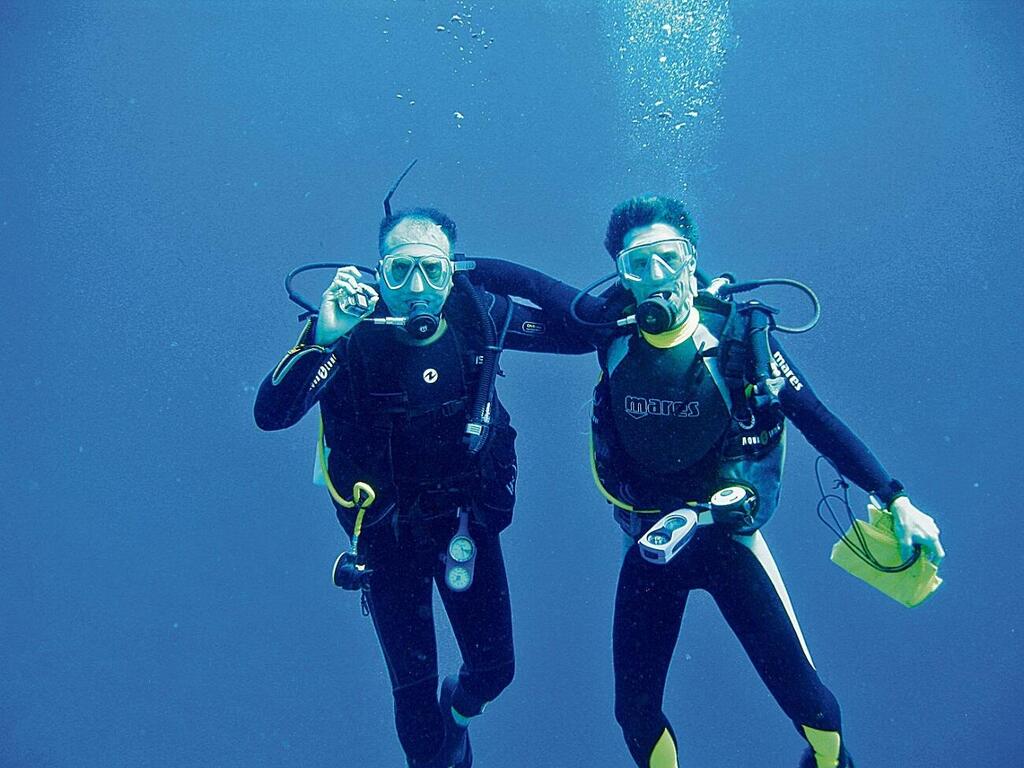

Prof. Yossi Matias dives in Sharm el-Sheikh with Prof. Steve Simpson
(Photo: Courtesy)
"Related or not, Matias and his team also collaborate on a study that examines the rehabilitation of damaged coral reefs — one of the most vulnerable ecological systems — using acoustic signals played to them through underwater speakers, along with Prof. Steve Simpson from the University of Bristol in the UK.
Worried, afraid and anxious
Let's talk judicial reform. In your role as the director of Google's R&D Center in Israel, do you feel any change or impact?
"I dwell among my people, and I'm not just director at Google and listening to our employees. I also serve as the chairman of the multinational companies forum in the country and from this role, I converse extensively with the heads of other centers. We cannot ignore what is happening around us. The concerns are immense. I am worried, apprehensive, and anxious about the future of Israeli high-tech due to the judicial reform crisis."
"Sadly, the numbers speak for themselves. According to the Startup Nation Policy report, in the first half of 2023, there was a 68% decrease in high-tech investments compared to the same period in 2022. Almost 70% of the companies are already taking active measures in pulling out cash reserves, registering abroad, relocating employees and laying off staff. True, there was a global economic crisis, but we see that the world is already beginning to recover, unlike us. I am more worried and anxious than I've ever been about the implications for Israeli high-tech, and of course, this has a direct impact on our economy."
"It's important to distinguish, Google, as a company, and I in my role as director, do not take a stance on this issue. Every one of our employees can hold any opinion. I have my own views too, and I don’t hide them – I frequently join my friends at demonstrations. I talk with Google employees, Googlers, and with other peers in the Israeli high-tech sector, and I hear deep concerns and statements I've never heard before.
“One characteristic of Google employees in Israel — and of our high-tech industry workers in general — is that they genuinely care. One could argue that those here choose to be here – since today's world is global. And what I observe is a growing, concerning rift among them."
When you meet with Google's top executives in the U.S., do you hear concerns about the stability of the Israeli branch or investments in the country? Do they say to you, 'Wait, maybe we should think twice about this.'
"No one is unaware or unconcerned about what's happening in Israel. I personally manage teams around the world; one thing I always ask myself regarding each location is how much I can rely on its stability. I'll just say that my colleagues and I — the heads of local centers for major international companies — do everything, even in times of crisis, to continue to support the Israeli high-tech sector; this task becomes increasingly challenging."
Where do you draw the line? Have you warned those who need to be warned?
"I share my opinions and concerns about the risky actions we're experiencing whenever I believe it might help. This includes frequent participation in protests, which constantly show me the immense care and concern of people from all walks of life, and reinforce my optimism that change is still possible. I sincerely hope that the disagreements will be resolved through dialogue and broad agreements."
You served as a pilot in the Air Force. At your age, I assume you no longer volunteer to fly. If you were of the right age – would you volunteer?
"In my opinion, in a real emergency situation, everyone would report for duty – that's what we always did in the past. The first time I went to the U.S., there was a security event in Israel, and the first thing I did was call my squadron, informing them that I was about to board a plane back. It was a given.
“However, I completely understand my fellow pilots - many of whom have volunteered for many years, making personal and family sacrifices and constantly risking their lives - who have made the decision to suspend their volunteering at this time based on moral imperative and genuine concerns for democracy in Israel."
Israel lagging behind
Do you agree with the claim that Israel did not recognize the potential inherent in AI in time and therefore missed the train and is not leading in the field? Do we still have a chance to jump on it?
"I think we could have been in a better position, and that we need to invest much more in AI on a national level. It's a revolution not only in technology but also in the sense that it creates new opportunities worldwide. When talking about a revolution, what's important is to look forward. Even in areas where we're lagging, we can run fast and lead again if we act correctly. Sometimes, by the way, even in fields where you lead, you need to run very fast to stay in place, like the rabbit in Alice in Wonderland."
You once said that in your opinion, every high school boy and girl should know how to code. Isn't that an exaggeration? Look at what happened to the humanities departments in universities. Is history no longer important? Philosophy? Art?
"On the contrary. I believe they are invaluable, today perhaps even more than ever. Both from an ethical and societal perspective, as well as in terms of the skills needed for the future. I am very proud to be one of the founders of the Google, Art and Culture project; I personally worked on uploading the Dead Sea Scrolls to the internet, scanning the Yad Vashem archives, as well as thousands of historic galleries and museums.
“I believe that whether someone becomes a philosopher, lawyer or writer, they should have basic understanding of coding. Furthermore, every young person should grasp the concept of artificial intelligence, regardless of profession or field of study. It's also crucial in today's world for engineers to have a grounding in ethics and business. Embracing broad perspectives and critical thinking is essential.
"Overall, one of our goals in recent years has been to lower the barriers to entry into the tech industry for as many populations that are currently underrepresented in the sector as possible, such as women, ultra-Orthodox Jews, Arabs, Ethiopian immigrants and residents of the geographical periphery. We believe that the more we succeed in this mission, the more it will benefit not just Google, because diversity fosters innovation and creates products that cater to a broader range of people, but primarily the industry and society as a whole.
“Recently, we launched a project on a $25 million dollar investment which includes programs to assist teenagers, students and early-career developers integrate into the high-tech industry."
You initiated the Google for Startup Campus, where you closely mentor young startups. Have you felt the decline in the number of startups in Israel in recent years?
"The tremendous growth we’ve seen in Israel over the past decade is astounding. Today, the expectations from startups are much higher, and naturally, there was an unprecedented increase in unicorns and a decrease in startups developing just another app. The entrepreneurs I meet today, even as a private investor, are at a level of maturity that we hadn't seen 15 years ago. When we established the Startup Campus, its primary goal was to give advice to entrepreneurs at the beginning of their journey. That's no longer needed today. Now, we give advice on machine learning and AI."
Trying is not failing
To the best of my knowledge, Google CEO Sundar Pichai has not yet visited Israel.
"Of course, we will update you as soon as we know about such a plan."
Do you speak?
“Certainly. By the way, many of the innovations that Sundar presents every year at Google's developer conference originated here with us. The facts speak for themselves: We have a lot of people here who have reached the level of global leaders in the company in various fields — search, research, Waze, cloud. Google established a sister company in Israel called Verily in the life sciences sector. Two years ago, we established a branch of X Labs here, the first outside of California, and we have a team dedicated to chip design.
“Also, the social initiatives we undertake here have become models within the company and global programs. I started Google for Startups here on campus ten years ago, and it has become an international program, with thousands of startups from around the world participating.
“Another program, Mind the Gap, which encourages girls to study sciences, started here in 2008 and today runs in 18 countries. In Israel, we expanded it into a national program called 'HelloTech', targeting all underrepresented populations — women, Arabs, Haredim, the geographical periphery — and now we are adding AI studies to it.”
With all sincerity, after 17 years at Google, can you maybe explain to us what this gigantic company is all about? It seems to span domains that cover the globe, yet without a clear focus.
"One of the fascinating features of Google is its ability to leverage technology it developed in one field to develop other areas. Google's vision is 'to organize the world's information and make it universally accessible and useful'. You're right that it's a very broad vision – but do we, as users, constantly tell ourselves, 'now I'm searching', 'now I'm writing on Gmail', 'now I'm reviewing my photos in Photoshop'? Everything is essentially different means to the same end."
"Edison once said, 'I have not failed, I've just found 10,000 ways that won't work'"
Experience shows that if Google starts working on, for example, 100 major projects, it can abandon 50 of them without batting an eye.
"Edison once said, 'I have not failed, I've just found 10,000 ways that won't work.' Everything eventually merges into something else. If I decide to change the focus of product development, it doesn't indicate failure. On the contrary, I've learned a lot from it. Some of the developments in Israel started as mere experiments and are now revolutionary.
Take the development of the Transformer, machine learning - work that was done at Google and paved the way for the entire artificial intelligence revolution. It too could be cataloged as one of those 50 projects that were 'discarded along the way'. But it's what led to this revolution."



